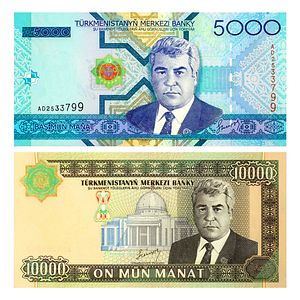Kazakhstan isn’t the only Central Asian country with currency and exchange troubles. Because it has the largest regional economy, Astana’s troubles get a significant amount of attention. But even Turkmenistan and Uzbekistan, which have not seen their growth rates plummet to the same extent as Kazakhstan, are suffering.
After recent reports of long lines at currency exchanges in Turkmenistan, the country has reportedly stopped the sale of foreign currencies. Eurasianet led coverage of the ban, writing that “workers at banks in Ashgabat informed customers that the restriction would remain in place indefinitely.” A Reuters correspondent who visited two exchange bureaus in Ashgabat was told the bureaus were only buying, not selling, foreign currencies, citing a central bank order.
In January 2015, Turkmenistan devalued its currency, allowing it to fall by 18.6 percent, according to an Economist Intelligence Unit report in August, settling at 3.5 manat per U.S. dollar. The EIU report noted, “The authorities have not publicly commented on the reasons for devaluing the currency.” The EIU report also forecast another devaluation because of slowing growth and persistently weak energy prices. Both the Eurasianet and Reuters reports cited public worries about devaluation as driving people to exchange their manats for dollars or euros. News websites run by exiled oppositionists say that the black market exchange rate for dollars has jumped to 4.20 manats per dollar.
Meanwhile in Uzbekistan, AKIpress reports that during the first week of the new year the black market exchange rate has jump from 5,300 to 6,100 soms per dollar. The official exchange rate is 2,821 soms per dollar. The EIU report from August commented that while Uzbekistan controls its currency closely, the black market is large and “typically trades around 30 percent above the official rate.” Uzbekistan maintains a crawling-peg exchange-rate, which means the currency appreciates and devalues gradually, ostensibly to avoid the stress of maintaining a fixed peg as well as the possible volatility of a floating rate.
Assessing the impact of region-wide economic stress is especially difficult in Uzbekistan and Turkmenistan, where the governments tend to not comment on bad news. Turkmenistan, for example, hasn’t made any statements about the ban on selling foreign currencies and never commented on the January 2015 devaluation. But reports last year that workers in some public sector jobs had not been paid pointed to a budget crunch.

































